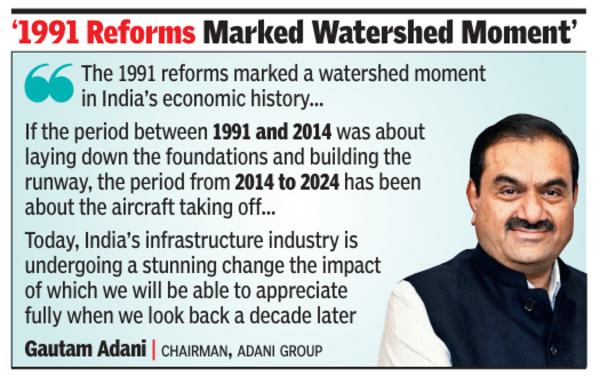It is building a renewable energy park in Khavda, Gujarat, among other clean energy projects. This facility, which it claims to be the world’s largest single-site renewable energy park, will generate 30GW of power, thereby taking its total green energy capacity to 50GW by 2030.Energy transition from fossil fuels to clean sources like solar, wind and hydrogen will “change the global energy landscape forever”, said the group’s chairman Gautam Adani.
Adani Group, which started with commodity trading before diversifying into ports and airports management and other businesses, wants to produce the “world’s least expensive green electron” to become the feedstock for several sectors that must meet the sustainability mandate, Adani said at Crisil Ratings’ infrastructure summit on Wednesday. In 2022, fossil fuel producer Reliance Industries announced that it will plow $76 billion towards clean energy projects.
Adani said data centres that house AI clouds will be the largest energy consuming industry in the world.
“This makes energy transition even more complex and is raising electricity prices, thereby adding to the already high prices because of the combined impact of climate change and demand growth.”
Adani said the infrastructure required for energy transition and the infrastructure required for digital transformation are now inseparable as the “technology sector becomes the largest consumer of the precious green electrons”.
“We already have India’s largest order book for data centres and are now in discussions for additional gigawatt-scale green AI data centres,” Adani said. At the Crisil event, the billionaire also highlighted India’s infrastructure growth trajectory.
“If the period between 1991 to 2014 was about laying down the foundations and building the runway, then the period between 2014 and 2024 has been about the aircraft taking off,” said Adani, adding that “the single most important catalyst enabling this takeoff has been the quality of governance over the past decade”.
Adani said the 1991 liberalisation policy by then FM Manmohan Singh marked a “major turning point”. “The breaking down of the License Raj meant that govt did away with industrial licensing for most sectors. It eliminated much of the requirement for businesses to obtain government permission to invest, or set prices, or build capacity.”
